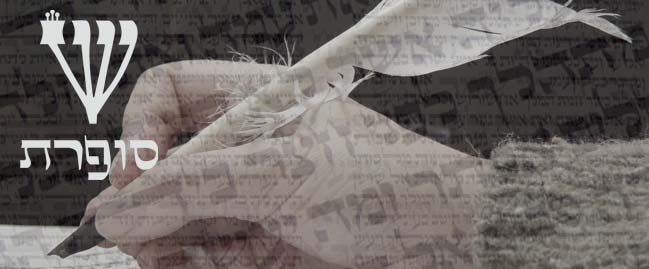WRITTEN BY MY RABBI
B"H
September 5, 2003
Issue of obligation, not desire
RABBI ROSS SINGER SPECIAL TO THE JEWISH BULLETIN
Your article on Aviel Barclay (Bulletin cover, Aug. 22) included a brief accounting of my position on the halachah regarding women writing sifrei Torah (Torah scrolls). I would like to clarify my position. I have studied and deliberated on this matter for about a year now. Due to the limitations of this venue, the following is an oversimplification of my view. Nevertheless, it will provide some understanding of my approach.
My inclination in matters of gender and halachah is to search the halachah for permissive and inclusive trends within our tradition. I understand the tradition itself encourages the expansion of sincere religious expression for women (as well as men) within halachic boundaries. From this perspective, I have studied on my own, as well as with Aviel, many texts regarding the issue of women serving as sofrot (scribes), and I have consulted with renowned Torah scholars. As of yet, I have not found within our traditional legal sources sufficient legal ground to validate women to write sifrei Torah. In fact, I found one lone voice in the classical literature whose legal arguments to validate women writing sifrei Torah seemed to me and many others to be questionable.
While my research found that sifrei Torah written by women would be pasul (ritually invalid for public Torah reading), I do not believe that it is therefore forbidden for women to write sifrei Torah. Rather, any woman who so desires, is permitted to write a sefer Torah. The fruit of her work, however, would not be considered valid for ritual use. Nevertheless, I imagine any hand-written sefer Torah would have tremendous personal significance and the process of writing it would be awesome and inspiring. It could be used for educational purposes, learning Torah or as a reference. In light of this, and knowing Aviel's integrity, ability and sincerity, I support Aviel's study of sofrut and her project to write a sefer Torah.
If you are like me, you find what I have written so far unsatisfactory. If you are like me, you are left asking, "Why on earth would a tradition that is supposed to bring us closer to God disqualify women from writing sifrei Torah?" A partial answer to this question is based on the overriding ethos of halachah. One of halachah's main principles is that zechuyot (merits or privileges) are granted primarily in relation to hiuvim (obligations or responsibilities). It is in part because the hovah (obligation) to write a sefer Torah, while incumbent upon Jewish men, does not apply to women and sifrei Torah written by women do not attain full validity.
I believe acceptance of this fact is key to the perseverance and development of our tradition. For thousands of years, our tradition taught us to look at ourselves as individuals who are obligated, endowed with responsibility, commanded. We now find ourselves immersed in a society that trains us to look at ourselves
as entitled.
As mentioned, halachah teaches that entitlement is not automatic. It grows out of responsibility. The opening narrative of our entire tradition emphatically demonstrates this point. Adam and Eve are entitled to remain in the garden only as long as they obey the Divine command. The rest of the discussion around halachic entitlement is commentary on this foundational story. A change in halachah that changes only privilege without changing obligation and responsibility is not in keeping with our age-old tradition. The validation of women writing sifrei Torah must be based first upon imposing an obligation for women to write sifrei Torah. As of now, I have not heard anyone suggest a change of the obligations. I, for one, am not sure we could change the halachah to require women to write sifrei Torah if we wanted to. Yet, even if we could, would now be the appropriate time? When the overwhelming majority of Jews do not consider themselves obligated to basic halachic requirements, are we to add new ones?
I find myself in the following dilemma. How can I maintain integrity of our tradition and, at the same time, validate sincere and legitimate religious yearning that will bring an individual and a community closer to God. I believe that I have found a path that to a large extent resolves this impasse. Shaarey Tefilah, the synagogue that I have the honor to serve, under my direction has commissioned Aviel to write a Megillat Esther for us. Because women are obligated to hear the Megillah, the thrust of the halachic discourse indicates that they are privileged to be valid scribes to write the Megillah. Whereas the writing of a sefer Torah by women is validated by one lone halachic voice, the writing of Megillat Esther is endorsed by a long list (and by my count a large majority) of renowned and reliable authorities whose halachic reasoning is persuasive.
This approach, while not fully satisfying egalitarian inclinations, provides an outlet for Aviel's talents and spiritual aspirations, a venue for our community to take pride in the accomplishments of one of its beloved members and, at the same time, maintains the tradition's vitality, integrity and ethos. If this short piece inspires support for this project, I believe our community and the Jewish people will be enriched. If it arouses a consciousness of the need to raise the banner of obligation and "commandedness" among those who disagree with my conclusions, we will be rewarded just the same.
Rabbi Ross Singer is the spiritual leader of Shaarey Tefilah Synagogue in Vancouver.














0 Comments:
Post a Comment
<< Home